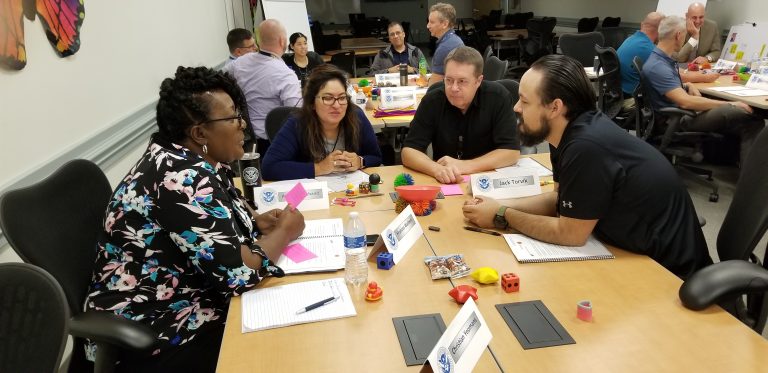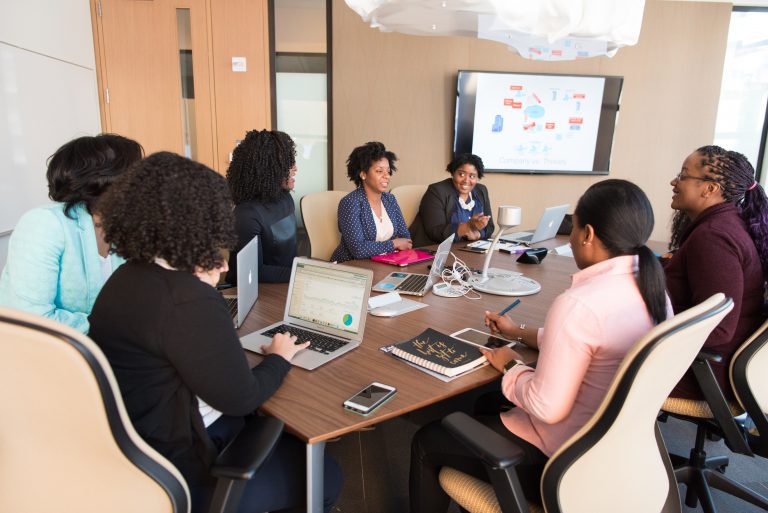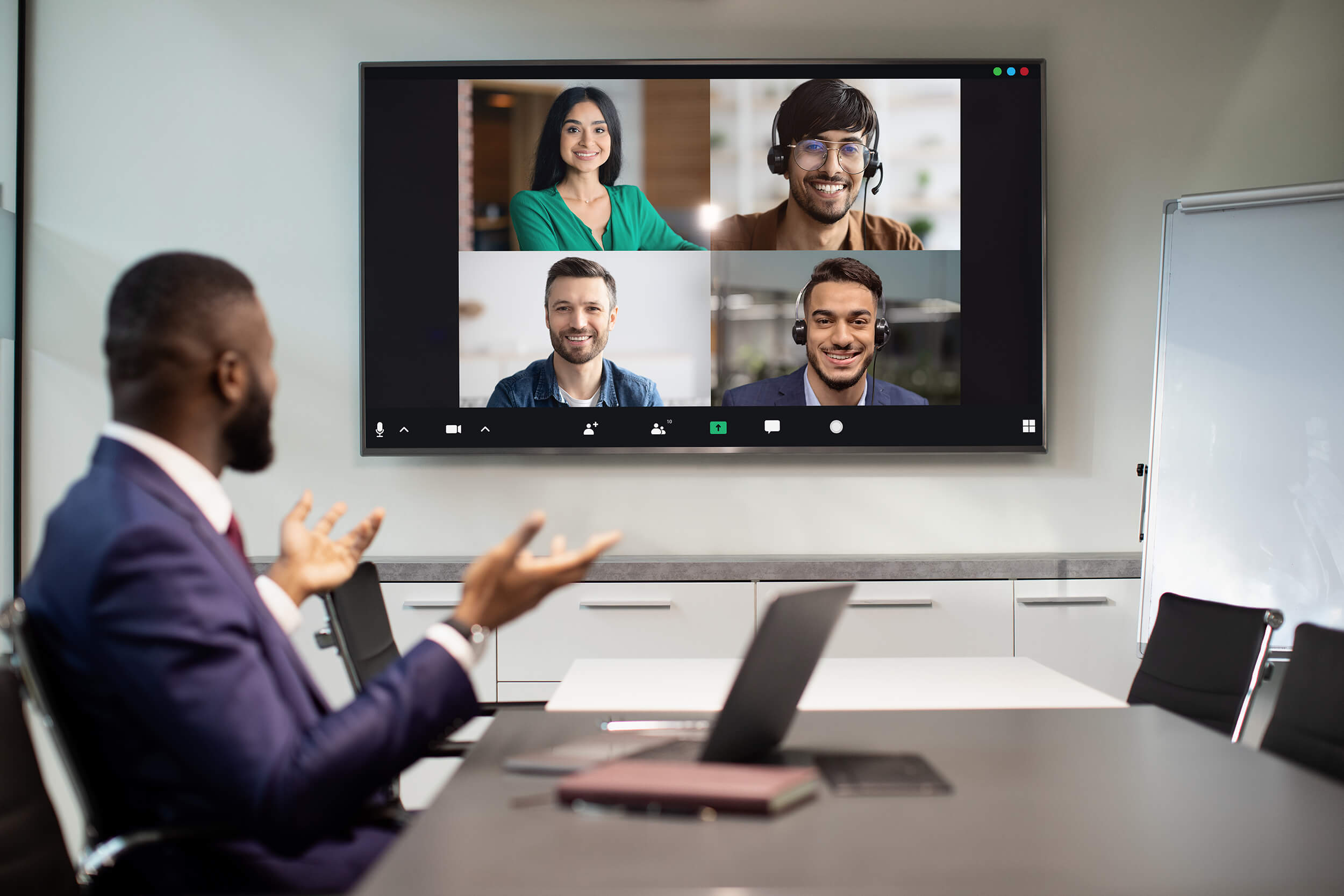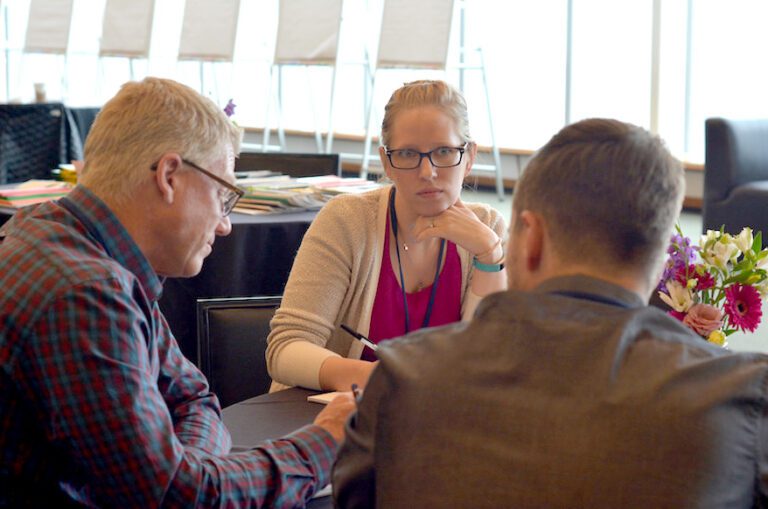Topics
Management Topics
- Being Creative
- Being a Manager
- Building Emotional Intelligence
- Communicating
- Dealing with Pressure
- Delegating
- Developing Staff
- Developing the Organization
- Embracing Diversity and Inclusion
- Engaging Employees
- Leading
- Leading Meetings
- Making Decisions and Solving Problems
- Managing
- Managing Change
- Managing Performance
- Negotiating
- Recruiting
- Resolving Conflict
- Self-Improvement and Learning
- Serving Customers
- Teambuilding
Being Creative

Lightening Up for Creative Management
Participants will experience different techniques that move thinking into an open, more creative mode for more effective problem solving and decision-making.

Managing Creativity
Participants will learn how to create a workplace that fosters and supports creativity and innovation.

Unleashing Creativity
Participants will learn 10 techniques to unleash their creativity.
Being a Manager

Developing Feedforward Skills
Participants will learn how to feedforward instead of giving feedback.

Don’t Jump to Quick Conclusions!
Participants will learn to ask questions to understand what is behind the obvious, instead of providing quick, easy solutions to complicated situations, to start solving the real issue or problem.

Getting Things Done
Participants will learn the five simple steps of getting things done that apply order to chaos and make work more productive and less stressful.

Managing Upward
Participants will learn the four key steps to making their bosses’ jobs easier.
Building Emotional Intelligence

Managing Emotions
Participants will learn how to recognize and address their emotional needs and the needs of others.

Becoming Self-Aware
Participants will learn how to identify and adjust the reasons behind their decisions and behaviors.

Gaining Empathy and Perspective
Participants will learn to recognize their empathetic strengths and shortcomings and how to view a situation from a perspective other than their own.
Communicating

Beyond Small Talk – Part One
Participants will learn how to recognize and move between four different levels of communication.

Beyond Small Talk – Part Two
Participants will learn five skills that create a results-generating dialogue.

Communicating Non-Defensively
Participants will learn the five skills of non-defensive communication.

Having Difficult Conversations
Participants will learn the seven steps of fierce conversations that question reality, provoke learning, tackle tough challenges and enrich relationships.

Now Hear This! Listening Skills
Participants will learn how to apply active listening principles in communications.
Dealing with Pressure

How to Spring the Time Trap – Part One
Participants will analyze what invests them in poor time management behaviors.

How to Spring the Time Trap – Part Two
Participants will learn time management tricks, such as the “Swiss cheese approach” to large projects.

Managing Energy
Participants will learn the four fundamental principles of energy management that will allow them to stay focused, productive and creative throughout the workday.

Managing Your Stress Before It Manages You!
Participants will identify stress management techniques that can help reduce stress, so they can assume healthy control over the negative stressors in their lives.
Delegating

Avoiding Upward Delegation
Participants will learn three key steps to stop upward delegation and get employees to take responsibility for more of their own decisions.

Feeling Comfortable with Delegation – Part One
Participants will learn how to use the six degrees of delegated decision-making authority.

Feeling Comfortable with Delegation – Part Two
Participants will practice planning an effective delegation.

Stop Rushing to Give Advice
Participants will learn about the righting reflex and how to use the OARS model to avoid providing unsolicited advice.
Developing Staff

Coaching for Performance
Participants will learn a five-stage coaching model.

Developing Your Staff
Participants will learn various staff development options on the job, in the organization and outside of the organization.

Grooming New Supervisors
Participants will learn about support options that can help a new supervisor be effective.

Make the Most of Your Mentoring Relationship
Participants will learn a 12-step process for cooperative development of a mentoring plan.
Developing the Organization

Creating a Culture of Openness
Participants will learn four ways that leaders can build a culture of trust and openness.

Managing Office Politics
Participants will learn seven ways to use office politics in a positive manner.

Using Appreciative Inquiry for Strategic Planning
Participants will learn the stages in the appreciative inquiry dialogue process that result in enthusiastic sharing, community building, and commitment generation.
Embracing Diversity and Inclusion

Applying Diversity
Participants will learn five strategies for promoting diversity in the workplace.

Beware of Your Biases
Participants will learn seven simple methods to fight against their unconscious biases.

Bridging the Generation Gap
Participants will learn about the four different generational cultures in the worksite, so they can decode generational miscommunications.

Managing Diversity and Inclusion
Participants will learn three tips for boosting and managing diversity in the workplace.
Engaging Employees

Addressing Employee Silence
Participants will learn to recognize and address four different types of employee silence to ensure open and honest communication.

Building Psychological Safety in the Workplace
Participants will learn how to use the steps to creating psychological safety in the workplace.

Creating a Positive Environment
Participants will learn the keys for creating and maintaining a positive work environment.

Influencing Behavior
Participants will learn how to use six decision triggers to influence specific behavior.

The Manager’s Motivational Tool Kit
Participants will learn how and when to use seven different motivational strategies to meet real on-the-job challenges.
Leading

Applying the Five Levels of Leadership
Participants will learn John C. Maxwell’s five levels of leadership and how to move upwards through them.

Recognizing Your Personal Leadership Style
Participants will determine their leadership style and learn how and when it is most effective.

If I Was Wrong
Participants will learn how to question their gut assumptions and see the situation in a richer array of potential alternatives.

What Shadow Do You Cast?
Participants will become aware of the impact they have on others and learn how what they do and say matters for people and organizations.
Leading Meetings

Improving Group Dynamics
Participants will learn how to assess and improve group dynamics.

Making Meetings Work
Participants will learn how to use meeting diagnosis elements to plan and conduct more effective meetings.

Successful Group Facilitation – Part One
Participants will define their facilitative roles and identify necessary facilitation skills.

Successful Group Facilitation – Part Two
Participants will learn ten steps for establishing a climate for open discussion.

Successful Group Facilitation – Part Three
Participants will learn group facilitation techniques and when to apply them.
Making Decisions and Solving Problems

Decision-Making Techniques
Participants will learn how and when to use different decision-making techniques.

Ensuring Effective Decisions
Participants will learn the two criteria for effective decisions and when to apply them.

Getting to the Root of Problems
Participants will learn how to use three cause-analysis techniques to determine the root cause of problems.

Starting with the Big Picture
Participants will learn the importance of analyzing the big picture and viewing decisions in context for making effective decisions.

Talking About the Big Picture
Participants will learn how to help their employees analyze the big picture and view decisions in context for making effective decisions.
MAnaging

Coaching Employees for Success
Participants will learn how to use the DO COACH NOW model.

When to Adjust Your Management Style
Participants will learn when to use six different management styles.

Working with Difficult Employees
Participants will learn how to stay objective to be more effective in situations involving difficult employees.

Managing a Hybrid Workforce
Participants will learn six steps to managing employees when some are in the office, and others are working remotely.
MAnaging Change

Building Employee Coping Skills
Participants will learn how to help employees face their fears or concerns, and identify the opportunities offered by the changes in their lives.

Coping with Change
Participants will learn the steps to take to develop a healthy and practical strategy for handling the stresses of change.

Change Management Techniques
Participants will learn the steps in the change management process.

Change Management Using the ADKAR Model
Participants will learn how to use the ADKAR model (Awareness, Desire, Knowledge, Ability and Reinforcement) to manage change.

Helping Employees Buy-In to Change
Participants will learn three change facilitation questions that should be answered before initiating a change.
Managing Performance

Conducting Performance Appraisal Interviews
Participants will learn the purpose of performance appraisal interviews and the steps involved in preparing for and conducting the interviews.

Monitoring Employee Performance
Participants will learn a variety of strategies for monitoring employee performance.

Setting Performance Expectations
Participants will learn strategies for setting achievable performance expectations.

User-Friendly Performance Management – Part One
Participants will learn a six-step performance management strategy.

User-Friendly Performance Management – Part Two
Participants will learn how to analyze performance problems.

Work/Life Balance for Better Performance
Participants will learn the importance of work/life balance for both employees and the organization, as well as options to use that will support employee work/life balance.
Negotiating

Getting Past “No” – Part One
Participants will learn a five-step strategy for handling negotiations in difficult situations.

Getting Past “No” – Part Two
Participants will practice naming, defusing, and reframing three typical negotiation tactics: stone walls, attacks, and tricks and lies.

Working It Out Without Working Each Other Over
Participants will learn win-win negotiation, focusing on three key steps.
Recruiting

Hiring the Right People – Part One
Participants will learn the three key criteria that successful candidates need to meet.

Hiring the Right People – Part Two
Participants will learn how to use an achievement history questionnaire to screen potential applicants.

Hiring the Right People – Part Three
Participants will learn how to create behavioral interview questions and develop benchmark answers for each question.

Successful Selection Interviewing Skills
Participants will discuss the purpose and stages of a selection interview

What Recruiters Can Learn from Marketing
Participants will learn how to use an achievement history questionnaire to screen potential applicants.
Resolving Conflict

Building Consensus on Sticky Issues
Participants will learn four steps to create objective decision-making criteria.

Catching Conflict Before It Begins
Participants will learn to identify and defuse six red flags of workplace conflict.

Conflict Management Strategies – Part One
Participants will learn how and when to use five different conflict management strategies, with particular emphasis on collaboration.

Conflict Management Strategies – Part Two
Participants will learn a four-step approach to conflict management.

Converting Conflict into Collaboration
Participants will learn the four steps to constructive communication.
Self-Improvement and Learning

Asserting Yourself – Part One
Participants will examine assertiveness concepts and analyze and address the roadblocks to assertiveness.

Asserting Yourself – Part Two
Participants will learn the prerequisites for assertive behavior and recognize when assertive behavior is necessary.

Asserting Yourself – Part Three
Participants will learn how to follow the steps in assertive problem solving and use an assertive communication strategy.

Developing a Growth Mindset at Work
Participants will learn 25 ways to develop a growth mindset.

Gaining Perspective
Participants will learn how to view other people’s actions, ideas and words against a larger context so that they will be able to manage their working relationships more effectively.

Transforming Your Anger into a Positive Tool
Participants will how to use the five steps for transforming anger into a more constructive approach.
Serving Customers

Communicating Value to Customers
Participants will learn how to capture the essence of what makes their products and service truly unique and communicate that consistently.

Dealing with Difficult Customers
Participants will learn how to handle difficult customer interactions by following a proven five-step procedure.

Providing Quality Customer Service
Participants will learn techniques to improve customer service.
Teambuilding

Bringing Energy to the Team
Participants will learn how, as managers and leaders, they can pull their teams out of a slump and get them firing on all cylinders again.

Building Teams that Work Together
Participants will learn how to use Big Five personality profiles to improve teamwork.

Managing Virtual Teams – Part One
Participants will learn how to build trust in virtual teams.

Managing Virtual Teams – Part Two
Participants will learn different technological strategies for managing virtual teams.

Teamwork Does Not Have to be Murder
Participants will learn how to identify and intervene in the five team developmental stages.
